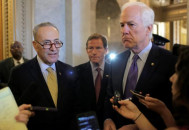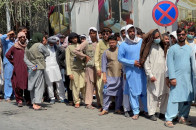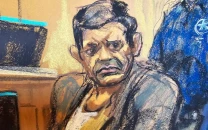India’s need for a decisive leader
It is hardly the case that state, its decisive leader can solve all problems, according to Pawar’s own reckoning.

The writer is a columnist. He is also a former editor of the Mumbai-based English newspaper Mid Day and the Gujarati paper Divya Bhaskar
aakar.patel@tribune.com.pk
First, that today’s young voters “want leaders who are decisive about their stands and the policies that will benefit the people and do not hesitate to roll out such policies”.
Second (referring to the academics consulting Sonia Gandhi), that “weak leadership at various levels has given rise to a bunch of pseudo-activists who have no connect with ground reality”.
Third, that Indira Gandhi would never have stood for such things: “She was strong and decisive. She took bold decisions, such as nationalisation of banks or ending privy purses, which she implemented with conviction and firmness.”
Let’s try and look at Pawar’s view from a critical perspective. First, his description of a ‘decisive leader’ indicates someone who is full of certitude. Such a leader is not usually mindful of the dissenting view and “does not hesitate to roll out” the policies he thinks will lead to benefit. But what if there is merit in the dissent?

It is difficult to understand what is so good then about such a decisive leader. The youth might well want quick solutions, but is it possible that they don’t exist?
Pawar refers to ‘pseudo activists’, presumably meaning people like Aruna Roy, but it is because of them that India has legislated outstanding laws like the Right to Information and the Right to Education and the Food Security Bill. It is difficult to see why their influence on government is a bad thing. And Pawar doesn’t illuminate us on this other than to tell us that he finds them ridiculous.
His example of a decisive leader, who didn’t pay heed to people unconnected to politics and its realities, is historically incorrect. Indira was advised by people like Inder Kumar Gujral and Romesh Thapar who had little connect with the grass roots. They were called her Kitchen Cabinet. In her later years, she was even advised by her unhinged son Sanjay, who failed in high school and had no education, and his gang of friends.
Her decision to nationalise all of India’s banks may have been made with firmness but was it the right thing to do? That is debatable.
The Privy Purses were something on which Sardar Patel gave his solemn word to the princely states that acceded to India. Was it such a good thing for India to violate Vallabhbhai’s contract inside 25 years? Again, this is debatable.
Strangely, Pawar then argues against himself by saying that the voters may not have necessarily done the right thing and Delhi’s revolutionary voters were hypocrites: “On one hand, the same class of people are responding and voting for the Aam Admi Party’s (AAP) call for a corruption-free Delhi and on the other hand, they are demanding that their illegal colonies be legalised. You will find such contradictions in Delhi.”
He also says that the AAP’s promises to bring down the price of onions are bogus because the state government isn’t in control of such things.
So, here’s an instance of a decisive leader making a reckless promise he cannot keep.
The fact is that wise leadership is usually cautious, unlike Pawar’s fantastic decisive leader. Wise leadership is conservative in the true sense of the word. That is to say, it is realist. The voter, especially the young one, is inclined to blame the state for his problems but it is hardly the case that the state and its decisive leader can solve all of them, according to Pawar’s own reckoning.
Published in The Express Tribune, December 15th, 2013.
Like Opinion & Editorial on Facebook, follow @ETOpEd on Twitter to receive all updates on all our daily pieces.



















COMMENTS
Comments are moderated and generally will be posted if they are on-topic and not abusive.
For more information, please see our Comments FAQ